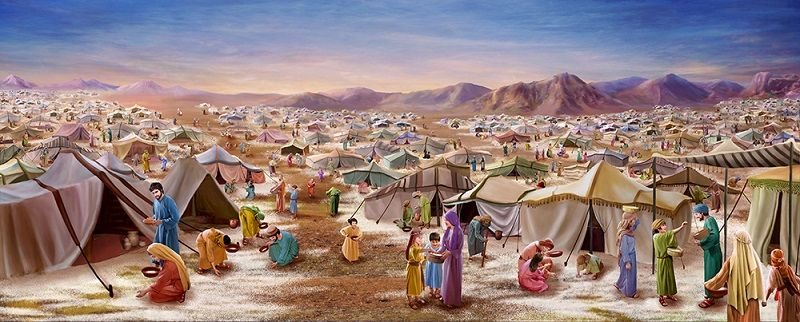Deuteronomy 8: Lessons to Learn From Your Wilderness Trials
Introduction: Although many Christians may not know Deuteronomy chapter 8, they know important parts of it because Jesus quoted from it to rebuff Satan’s temptations in the wilderness. This chapter, however, is important for many other reasons. Here, God gives seven lessons to prepare you for blessings that He has waiting for you. First, He advises that He will prepare you for blessings by first taking you into the wilderness to show you where your heart needs correction. Second, He will test you with both scarcity and abundance to show you that only He can satisfy your deepest needs. Third, like a loving Father, He will take you into the wilderness to correct your behavior when your pride blocks His other efforts to reach you. Fourth, when you are ready, He wants to bless you with abundance so that you can be a steward of His things on Earth. These blessings are symbolized by the water of life and the seven foods of the Promised Land that He offers each believer. He wants to bless you so that you can bless Him back through your prayers and tithes to support His Church. Fifth, when times of abundance come, He warns us not to forget Him. Sixth, when times of abundance come, He does not want you to credit yourself with your success. Finally, He warns that if you credit yourself with your success, it may ultimately become a source of idolatry in your life. This may also ultimately lead to self-destructive behavior and sorrow.
1. Testing. God Takes You into the Wilderness to Humble You and Show You Areas Where Your Heart Needs Correction. Dt. 8:1-2.
God tests you to show you where your heart needs correction. God cannot tempt you (Jam. 1:13-14). He does, however, test you to humble you and to show you where your focus is on the wrong things: “All the commandments that I am commanding you today you shall be careful to do, that you may live and multiply, and go in and possess the land which the Lord swore to give to your forefathers. You shall remember all the way which the Lord your God has led you in the wilderness these forty years, that He might humble you, testing you, to know what was in your heart, whether you would keep His commandments or not.” (Dt. 8:1-2). “[F]or God has come in order to test you, and in order that the fear of Him may remain with you, so that you may not sin.” (Ex. 20:20(b)). “I, the Lord, search the heart, I test the mind, . . .” (Jer. 17:10; 20:12). “The Lord tests the righteous and the wicked . . .” (Ps. 11:5; 66:10). He tests you to show you where your heart is evil (Jer. 17:9). Even though David was an adulterer and a murder, he later showed that he had learned from God’s mercy and grace by inviting God to search his heart to expose his remaining hidden sins (Ps. 139:23). Even though David committed horrible sins, his openness to learning from his sins is what made him a man after God’s heart (Acts 13:22). Are you willing to let God show you your hidden sins?
Let God mold you through His tests and trials1
Be joyful in times of trial. No one ever likes a trial. There is often pain, sorrow, and apprehension. Believers frequently expect God to shield them from any harm. Yet, our thoughts are not His thoughts (Is. 55:8). Even when a trial makes no sense, He wants you to look for the good in the trial because they are opportunities for you or others to grow in your walk or their walk: “Consider it all joy, my brethren, when you encounter various trials,” (Jam. 1:2; Ro. 12:2). If we say to God that there is no need for Him to test us because we are not sinners, His truth is not within us (1 Jo. 1:8). Are you bitter any time there is disappointment in your life? What kind of a witness are you when times are bad?
2. Provision. God Takes You into the Wilderness to Help You Understand that He will Provide for You and So that You Will Learn to Depend upon Him to be Satisfied. Dt. 8:3-4.
God will test you with both scarcity and abundance to show that only God can fill your soul. Moses reminded the Jews that God brought them through the extremes of hunger and abundance. He even miraculously protected both their clothes and feet. He wanted them to know that material things alone could not fill what was missing in their lives. They also needed God: “He humbled you and let you be hungry, and fed you with manna which you did not know, nor did your fathers know, that He might make you understand that man does not live by bread alone, but man lives by everything that proceeds out of the mouth of the Lord. Your clothing did not wear out on you, nor did your foot swell these forty years.” (Dt. 8:3-4). The Jews had many lessons to learn. They left with “a large number of livestock” (Ex. 12:37), yet they still coveted the “pots of meat that they had in Egypt.” (Ex. 16:3). To answer their complaints, God promised to “rain bread from heaven for you . . . every day, that I may test them . . .” (Ex. 16:4). The Jews failed His test. First, after being told not to hoard the Manna, they ignored His request and tried to hoard it anyway (Ex. 16:20). Second, after God then told them not to collect the Manna on the Sabbath, they tried to collect it on the Sabbath anyway (Ex. 27). Later, the Jews complained about the Manna that He gave them (Nu. 11:34). They again craved the meat that they had in Egypt. To show them the evil in their hearts, He promised to give the Jews meat until it went out their noses. He promised that it would become loathsome to them (Nu. 11:20). He called the place where they hoarded the meat “Kibroth-hattaavah,” which means the “graves of greediness” or “craving” (Nu. 11:34). It was a place where the entire society became consumed with greed. During the journey, the Jews had failed to learn from His testing. Their craving for the things of the flesh would never satisfy their needs. They needed God. If you are craving the things of the World, should you expect those things to satisfy your needs? (1 Jo. 2:15-17).
God provided for His people in the wilderness2
Satan’s attempt to tempt Jesus’ in the wilderness. After Jesus spent 40 days in the wilderness, Satan sought to tempt Him. He tested Jesus by saying that He could end His hunger by turning the rocks around Him into bread (Matt. 4:3). Jesus responded by quoting Deuteronomy 8:3: “It is written, ‘Man shall not live on bread alone, but on every word that proceeds out of the mouth of God.” (Matt. 4:4). The words that Jesus quoted were in direct reference to Him as the Messiah. In Hebrew, a definite article appears before the word “man.” The sentence is literally translated as “the man does not live by bread alone, but the man lives by every word of God.” Jesus was referred to 88 times in the New Testament as the “son of Man.” This was a reference to Him as the Messiah. Jesus was telling the devil that “the Messiah” lives upon God’s Word, not bread. Jesus would not take the shortcuts that the devil offered, nor should you. Jesus was the Word that came from God’s mouth and became flesh (Jo. 1:1, 14). Don’t look for fulfillment from the things of the flesh that the devil offers. That fulfillment does not last. Jesus offers the peace that surpasses all understanding (Phil. 4:7). Are you looking for fulfillment from the world or the Word?
3. Discipline. When God’s Testing and Acts of Miraculous Provision Will not Correct You, God takes You into the Wilderness to Discipline You. Dt. 8:5.
Like a father, God disciplines you out of love. God’s discipline is never done out of malice. As the Heavenly Father of the Jews, He brought discipline in the wilderness out of love to correct their behavior: “Thus you are to know in your heart that the Lord your God was disciplining you just as a man disciplines his son.” (Dt. 8:5). “Out of the heavens He let you hear His voice to discipline you; and on earth He let you see His great fire, and you heard His words from the midst of the fire.” (Dt. 4:36). He will also discipline you out of love (Heb. 12:6). Are you grateful for your growth from His discipline? Or, do you grumble and complain each time He allows for hardships and challenges in your life?
Let obedience be the fruit of your faith3
God has given you through the Holy Spirit the power of discipline and self-control. Today, God has empowered you through the Holy Spirit with a spirit of discipline: “For God has not given us a spirit of timidity, but of power and love and discipline.” (2 Tim. 1:7). Jesus’ “disciples” were the “disciplined ones” in keeping His commandments. With the power of the Holy Spirit, you have the power to say no to the temptations of the flesh and exercise self-control. Are you allowing the Holy Spirit to check your flesh?
Follow God’s example and discipline children out of love. If you love your children, you will also discipline them with a parent’s love: “Fathers, do not provoke your children to anger, but bring them up in the discipline and instruction of the Lord.” (Eph. 6:4). Are you the rod of discipline for your children? Or, are you allowing bad behavior to go uncorrected?
4. Stewardship. God Takes You into the Wilderness to Prepare You to be a Good Steward with His Blessings. Dt. 8:6-10.
God’s promise of the blessings of water and the seven foods. If the Jews kept the Law out of love, God promised to bless them with water and seven specific foods in the Promised Land: “Therefore, you shall keep the commandments of the Lord your God, to walk in His ways and to fear Him. For the Lord your God is bringing you into a good land, a land of brooks of water, of fountains and springs, flowing forth in valleys and hills; (1) a land of wheat and (2) barley, (3) of [grape] vines and (4) fig trees and (5) pomegranates, (6) a land of olive oil and (7) honey; a land where you will eat food without scarcity, in which you will not lack anything; a land whose stones are iron, and out of whose hills you can dig copper.” (Dt. 8:6-9). As set forth below, both the water and the seven foods foreshadowed Christ.
Where God guides, He provides4
The water of life. The water symbolized both life and purity. While in the wilderness, God provided life-giving water by transforming undrinkable water (Ex. 15:25-27). He also caused water to miraculously pour through a rock (Ex. 17: 5-6; Nu. 20:11). Under the laws for the sacrifices, water was also used to cleanse an offering before it was presented to God (Lev. 15:31). For example, the priests washed the “entrails” and the legs of a sacrifice (Lev. 1:9). They also washed themselves before service (Lev. 8:6; Nu. 8:7). They used water to cleanse a healed leper (Lev. 14:5:8, 9). A priest also cleansed himself with water when he was contaminated by death (Nu. 11:12). Jesus offered “streams of living water to flow from deep within.” (Jo. 7:37-38). He gives us eternal life. He also cleanses us. He also gave an example of this when he washed the disciples’ feet during the last supper. Even though the disciples were saved, they still needed to be cleansed of the sins of the world (Jo. 13:5-10). At His death, He poured out both blood and living water (Jo. 19:34; 1 Jo. 5:6). You are justified by His blood, and His water sanctifies you (Eph. 5:26). Thus, “[l]et us draw near . . . having our hearts sprinkled clean from an evil conscience and our bodies washed with pure water.” (Heb. 10:22). If you are not repenting of your sins, you carry the filth of your sins around with you. Are bathing daily in the Word?
(1) The barley. (salvation). Barley was the first food that came from the first of three seasonal harvests. Each of the three harvests represents a stage in a believer’s walk with God: (1) barley = justification, (2) wheat = sanctification, and (3) fruit = glorification. Barley was offered during the Feast of First Fruits (Lev. 23:9-14). This corresponded with Christ’s resurrection and symbolized the offering of a new believer (1 Cor. 15:20). When Jesus fed the masses of followers, He also used “five barley loaves and two small fishes.” (Jo. 6:9). When they were filled, He said unto His disciples, “Gather up the fragments that remain, that nothing be lost.” (Jo. 6:12). These believers were part of the masses. They were not close to Jesus. Yet, they were saved and had overcome death. Are you part of the masses of believers who float in and out of church? Or, are you set apart from the world for Jesus?
(2) The wheat. (sanctification). Wheat was offered at the Festival of Weeks. (Shovuot) (Lev. 23:15-22). This was the same date as Pentecost (Acts 2:3). In reference to the second feast, John the Baptist refers to a “wheat” harvest: “He shall baptize you with the Holy Spirit and with fire . . . He will thoroughly purge His threshing floor and gather His wheat into the barn, but He will burn up the chaff with fire that cannot be put out.” (Matt 3:11-12). Because this second feast happened at Pentecost, it corresponded with the indwelling of the Holy Spirit. Not all believers are set apart for God. Many who live in the flesh are like rough barley bread. If they live by the Spirit, they are like sweet wheat bread. If you are part of the masses, your walk in the Lord is like eating barely bread. Although nutritious, it does not taste good. Today, it is mainly used for beer. Yet, if you are set apart for God, you are like freshly baked wheat bread to God. How do you think He would describe your walk?
(3) The grape vines. (communion and glorification). The grapes were cultivated as part of the Fall harvests and used to make wine. The Jews drank a small “hin” of wine as a “drink offering” with their other sacrifices (Nu. 15:5, 7, 10; Lev. 23:13). Jesus repeatedly used wine as a metaphor. One of His first miracles was to create multiple gallons of wine (Jo. 2:6-11). He is the vine of life that we drink, and the wine symbolizes His blood (Jo. 6:53). We drink His symbolic blood because we remember that our sins were transferred to Him through His blood (1 Cor. 11:25). In handing a cup of wine to the disciples, Jesus said: “This is my blood of the covenant, which is poured out for many.” (Mk. 14:24). We drink wine or grape juice to be in communion with Christ. As a symbol of communion, Paul also compared his life sacrifice to a wine “drink offering”: “even if I am being poured out as a drink offering upon the sacrifice and service of your faith, I rejoice and share my joy with you (Phil. 2:17; same, 2 Tim. 4:6). In this context, the wine drink offering is a symbol of joy or happiness: “[The Lord] makes ... plants for man to cultivate – bringing forth food from the earth: wine that gladdens the heart of man . . .” (Ps. 104:14(f)). “Go . . . drink your wine with a joyful heart . . .” (Ecc. 9:7). When you are in communion, people should see the joy of the Lord radiating out of your life. Sharing a drink in communion is also an act of friendship. If the barley symbolizes justification and the wheat symbolizes sanctification, the grapes symbolize being glorified in heaven. Some believers don’t drink as a sacrifice to store up their treasures in heaven (Matt. 6:20). Jesus promises that we will drink the fruit of the vine with Him in the future (Matt. 26:29). Is your life a joyful drink offering to God? Are you sacrificing pleasures here for treasures and fellowship in heaven?
(4) Figs. (Provision). The fig tree is common to the Middle East and was one of the first cultivated plants. The fig is first mentioned in Genesis. After eating the forbidden fruit, Adam and Eve covered themselves in “fig” leaves (Gen. 3:7). It symbolized God’s grace in providing even when it is underserved. During the Messiah’s reign “each man [will sit] under his own vine and fig tree.” (1 Kings 4:25; Zech. 3:10). This foreshadows an idyllic life of peace and prosperity. When Jesus was alive, He was hungry and came to a fig tree looking for food. Yet, the tree only had leaves on it without figs to eat. He then cursed the fig tree, which caused it to wither (Matt. 21:18–22; Mk. 11:12–14, 19–21). All of Jesus’ actions had meaning. We are like branches of the fig tree. Every person can be grafted onto the branches of Jesus’ vine (Jo. 15:1-4). Yet, if a person does not bear the fruit of Jesus, he or she has never truly taken root in Jesus. That person’s branch only has value as firewood (Jo. 15:6). Is your life rooted in Jesus, the true vine of life? Are you showing the fruit of Jesus in your life? Do you give thanks for God’s provision in your life?
(5) Pomegranates. (Righteousness). The Jews considered the pomegranates with its many seeds to represent the 613 commandments and statutes in the Torah. The 613 commandments and statutes include 248 “positive commandments” (mitzvot aseh). These correspond to the number of bones and main organs in the human body. There are also 365 “negative commandments” (mitzvot lo taaseh). These correspond to the number of days in the solar year (Babylonian Talmud, Makkot 23b-24a). In the Old Testament, compliance with the Law was the only hope of obtaining “righteousness” before God: “For Moses writes that the man who practices the righteousness which is based on law shall live by that righteousness.” (Ro. 10:5). “It will be righteousness for us if we are careful to observe all this commandment before the Lord our God, just as He commanded us.” (Dt. 6:22-25). In the New Testament, you are told to obey the Law out of love and not obligation. If you use His mercy and grace as a license to ignore the Law, you may become a slave to sin. By contrast, if you obey the Law out of love and devotion, you become a slave to righteousness: “Do you not know that when you present yourselves to someone as slaves for obedience, you are slaves of the one whom you obey, either of sin resulting in death, or of obedience resulting in righteousness?” (Ro. 6:16). Today, the righteousness that brings salvation comes only from your faith in Christ and not by following the Law (Phil. 3:9; Ro. 10:5). For “if righteousness comes through the Law, then Christ died needlessly.” (Gal. 2:21). He is both the Lord and son of “Righteousness” (Jer. 23:6; Mal. 4:2). If you “seek first His kingdom and His righteousness, and all these things will be added to you.” (Matt. 6:33). Yet, Jesus says that if you love Him you will still keep His Commandments out of love and not obligation. “If you love Me, you will keep My commandments.” (Jo. 14:15, 21; 15:10; 1 Jo. 5:3; 2 Jo. 1:6). “[I]f you wish to enter into life, keep the commandments.” (Matt. 19:17). Are you ignoring the Law in your life? If so, what does Jesus think of your love for Him?
(6) Olive oil. (the Holy Spirit). The Jews were previously told to bring clear oil of “beaten olives” for the lamp of the Tabernacle (Ex. 27:20). Oil in the Bible symbolizes the Holy Spirit (1 Sam. 16:13). With the Holy Spirit, God gives you nine other kinds of fruit. “[T]he fruit of the Spirit is (1) love, (2) joy, (3) peace, (4) forbearance, (5) kindness, (6) goodness, (7) faithfulness, (8) gentleness and (9) self-control.” (Gal. 5:22-23). Yet, like the olives, we need to be crushed of our own will before the Holy Spirit can come upon us (2 Cor. 4:8). God does not care for an offering if it is made out of selfish motives (Prov. 5:8; Isa. 1:13; Jer. 7:21-24; Amos 5:21-24). Are all nine fruits visible in your life? If not, what does that tell you about whether your will has been fully crushed?
(7) Honey and the land without scarcity. (The manna in heaven). At the valley of Eshcol, the Jewish spies found a land overflowing with milk and honey, just as God had promised (Nu. 13:27; 14:8). Our Promised Land is also a place without scarcity. The “honey” symbolizes the sweetness of God’s provision. For example, the manna that He gave in the wilderness tasted like wafers made of “honey” (Ex. 16:31). The people were able to boil or bake the manna (Nu. 11:8). They also never needed to worry about whether they would receive it. With the exception of the Sabbath, it came every night like the dew (Nu. 11:9; Ex. 16:22, 27). Yet, at one point the people grew tired of the manna because their “appetite” for it was gone (Nu. 11:6). Christ revealed that He was the manna in the wilderness (Jo. 6:32, 38, 41, 51). Just as the people rejected the manna in the wilderness, they later rejected Christ when He revealed that He was the true manna (Jo. 6:51). Just like the Jews in the wilderness, the Jews in Jesus’ day rejected His manna for the flesh. If you long for the things of your old life, Jesus says that you are not fit to live in heaven (Lk. 9:62). Jesus promises that if you accept His manna you will live forever: “I am the living bread that came down out of heaven; if anyone eats of this bread, he will live forever; and the bread also which I will give for the life of the world is My flesh.” (Jo. 6:51). Have you grown tired of what Jesus has to offer? Do you long for the things of the world? Or, do you look forward with great expectation for the land of sweet honey and abundance that awaits you?
Bless God in your prayers. Christians are accustomed to blessing their food before every meal. That tradition comes from the Jews. Yet, as it was originally intended, the Jews were to bless God, not the food, following their meals: “When you have eaten and are satisfied, you shall bless the Lord your God for the good land which He has given you.” (Dt. 8:10). Based upon this verse, the Jews were to cite the “Grace after Meals” prayer after every meal. The prayer consisted of four blessings. It also looked forward to the Messianic era. Do you give thanks to God for your meals? Do you bless Him in your prayers?
Bless God through your tithes. You can also bless God with your tithes. Tithing is the one time where a believer is allowed to test God: “Bring the whole tithe into the storehouse, so that there may be food in My house, and test Me now in this,’ says the Lord of hosts, ‘if I will not open for you the windows of heaven and pour out for you a blessing until it overflows.’” (Mal. 3:8-10; Prov. 3:9). Your tithes are a blessing to God because He can use your tithes to bless others (Jam. 1:27). Your blessings and intercessory prayers may also help to undo the “curses”, hardships, or struggles that others face in life. If you are only tithing when times are good, how much trust are you showing God?
5. Forgetfulness. God Takes You into the Wilderness Because He Does Not Want You to Forget Him when He Blesses You. Dt. 8:11-14.
Prosperity can be a spiritually dangerous place. God took the Jews into the wilderness to prepare them so that they would not forget Him in times of prosperity: “Beware that you do not forget the Lord your God by not keeping His commandments and His ordinances and His statutes which I am commanding you today; otherwise, when you have eaten and are satisfied, and have built good houses and lived in them, and when your herds and your flocks multiply, and your silver and gold multiply, and all that you have multiplies, then your heart will become proud and you will forget the Lord your God who brought you out from the land of Egypt, out of the house of slavery.” (Dt. 8:11-14). Solomon, the wisest and richest man ever to live, prayed that God would only give him what he needed so that he would not forget God in times of plenty: “ . . . give me neither poverty nor riches; feed me with food convenient for me. Lest I be full, and deny [thee], and say, who [is] the LORD?” (Prov. 30:8-9). Has your passion for Christ cooled with prosperity and wealth?
Remember that all your blessings are from God5
6. Dependence. God Takes You into the Wilderness Because He Does Not Want You to Believe His Blessings are the Results of Your Own Merits. Dt. 8:15-17.
God is the source of your success. Moses reminded the Jews that they were not to take credit for their success because God had provided for them: “He led you through the great and terrible wilderness, with its fiery serpents and scorpions and thirsty ground where there was no water; He brought water for you out of the rock of flint. In the wilderness He fed you manna which your fathers did not know, that He might humble you and that He might test you, to do good for you in the end. Otherwise, you may say in your heart, ‘My power and the strength of my hand made me this wealth.’” (Dt. 8:15-17). God warns you not to deny His existence or His provision in your life: “You felt secure in your wickedness and said, ‘No one sees me,’ Your wisdom and your knowledge, they have deluded you; for you have said in your heart, 'I am, and there is no one besides me.’” (Is. 47:10). Today, we live in a world where public credit for God has rapidly disappeared. People exalt themselves over God. Where does every good and perfect thing in your life come from? (Jam. 1:17).
Boast only in the Lord. If you boast, you should only boast in what God has done: “but let him who boasts boast of this, that he understands and knows Me, that I am the LORD who exercises lovingkindness, justice and righteousness on earth; for I delight in these things,” declares the LORD.” (Jer. 9:24). “Let him who boasts, boast in the Lord.” (1 Cor. 1:31; same, 2 Cor. 10:17). “But may it never be that I would boast, except in the cross of our Lord Jesus Christ, through which the world has been crucified to me, and I to the world.” (Gal. 6:14). Do you praise God for every good and perfect thing in your life?
7. Idolatry. God Takes You into the Wilderness Because He Does Not Want You to Turn Your Success into Self-idolatry and Sorrow. Dt. 8:18-20.
Self-adulation can become a source of idolatry. Failing to credit God with success may ultimately lead to self-destructive behavior: “But you shall remember the Lord your God, for it is He who is giving you power to make wealth, that He may confirm His covenant which He swore to your fathers, as it is this day. It shall come about if you ever forget the Lord your God and go after other gods and serve them and worship them, I testify against you today that you will surely perish. Like the nations that the Lord makes to perish before you, so you shall perish; because you would not listen to the voice of the Lord your God.” (Dt. 8:18-20). “For because of your trust in your own achievements and treasures, even you yourself will be captured; and Chemosh will go off into exile together with his priests and his princes.” (Jer. 48:7). If you are self-centered, ultimately you may hurt yourself and others. For some, the need to feed their own flesh leads to drug abuse or other evils. Is there any area where you need to repent?





